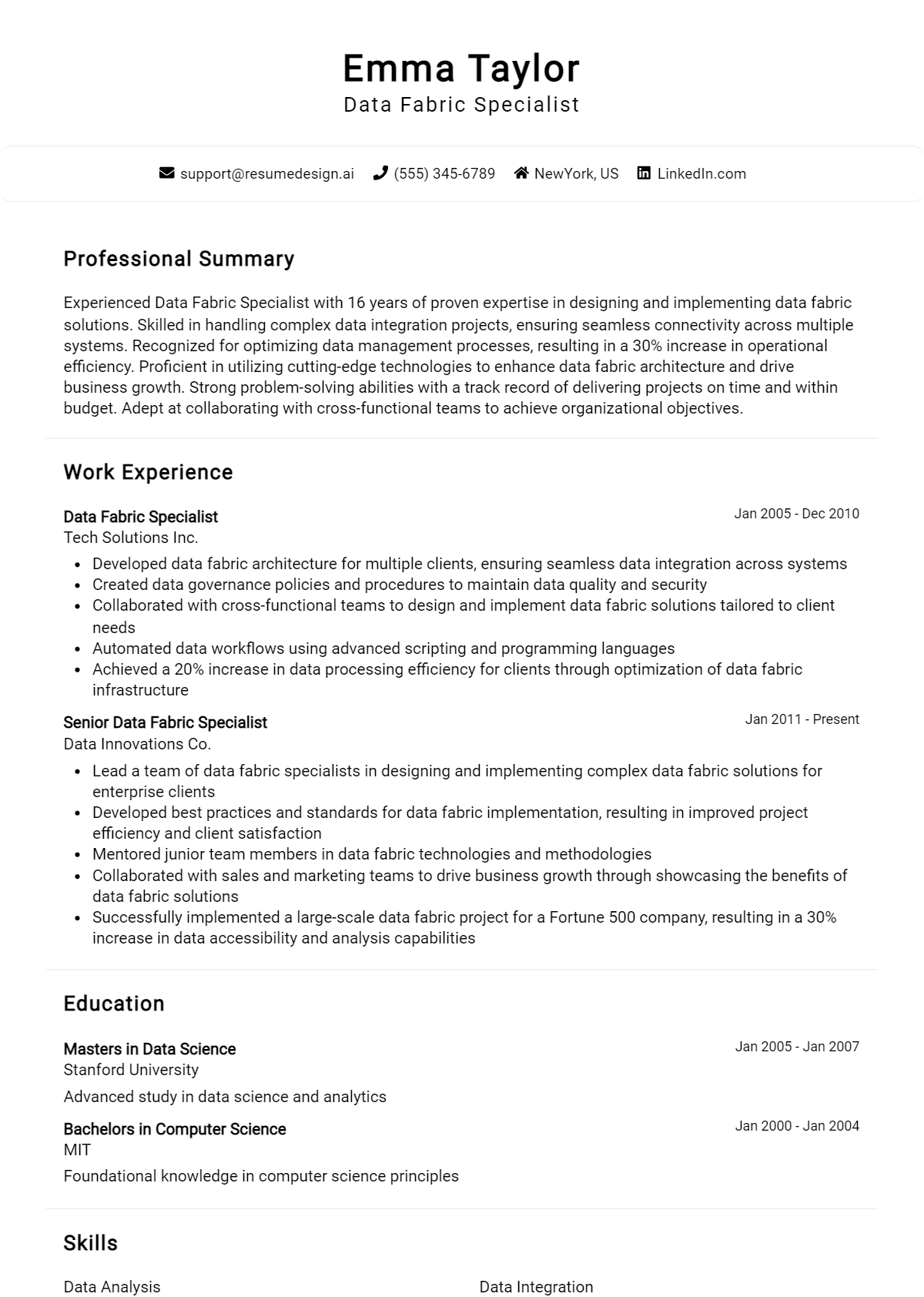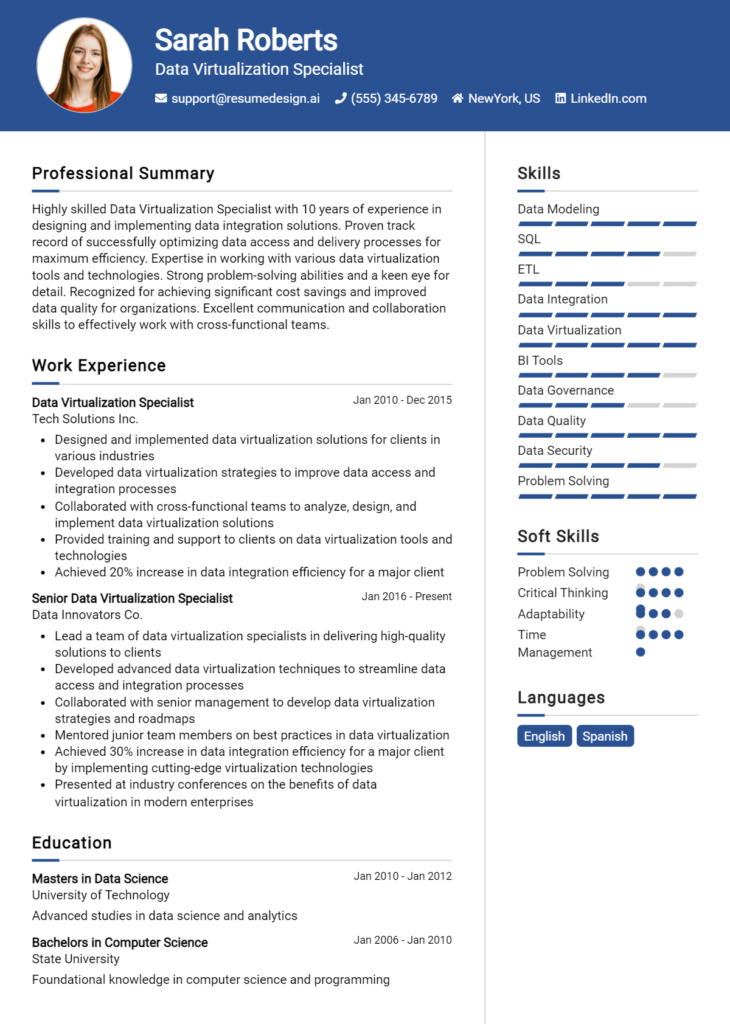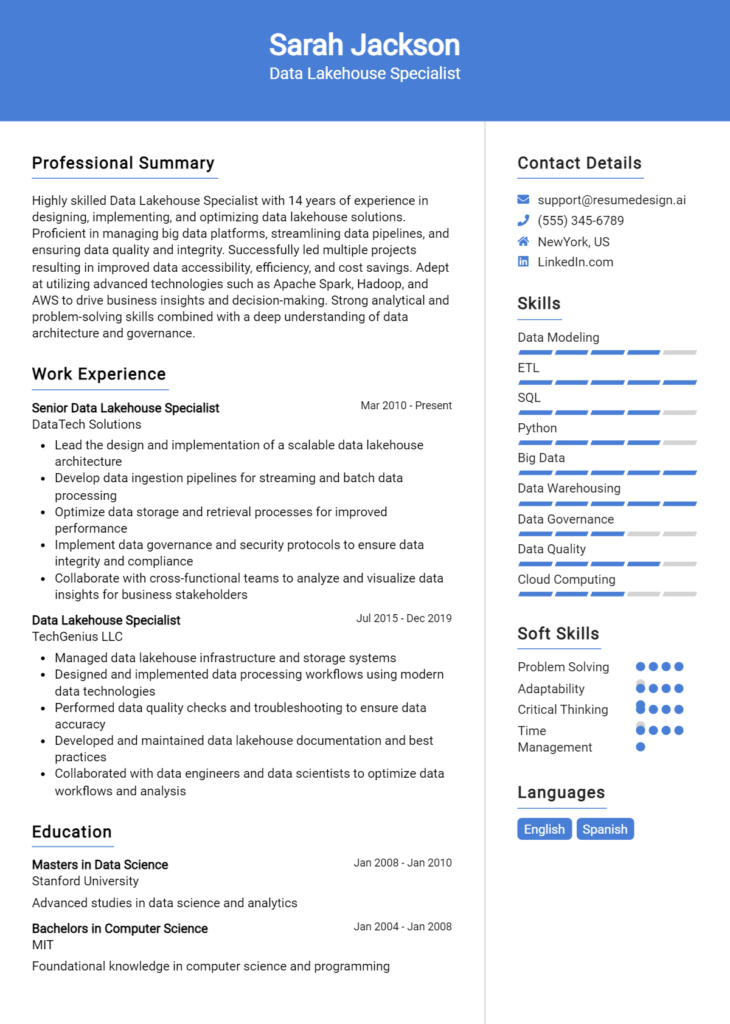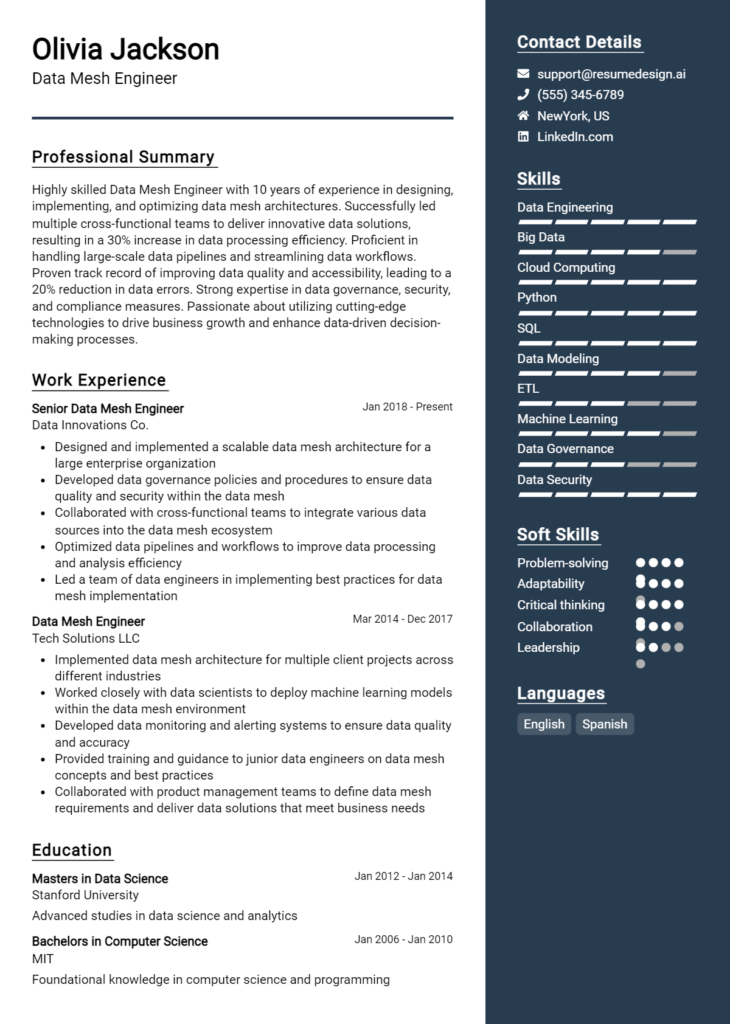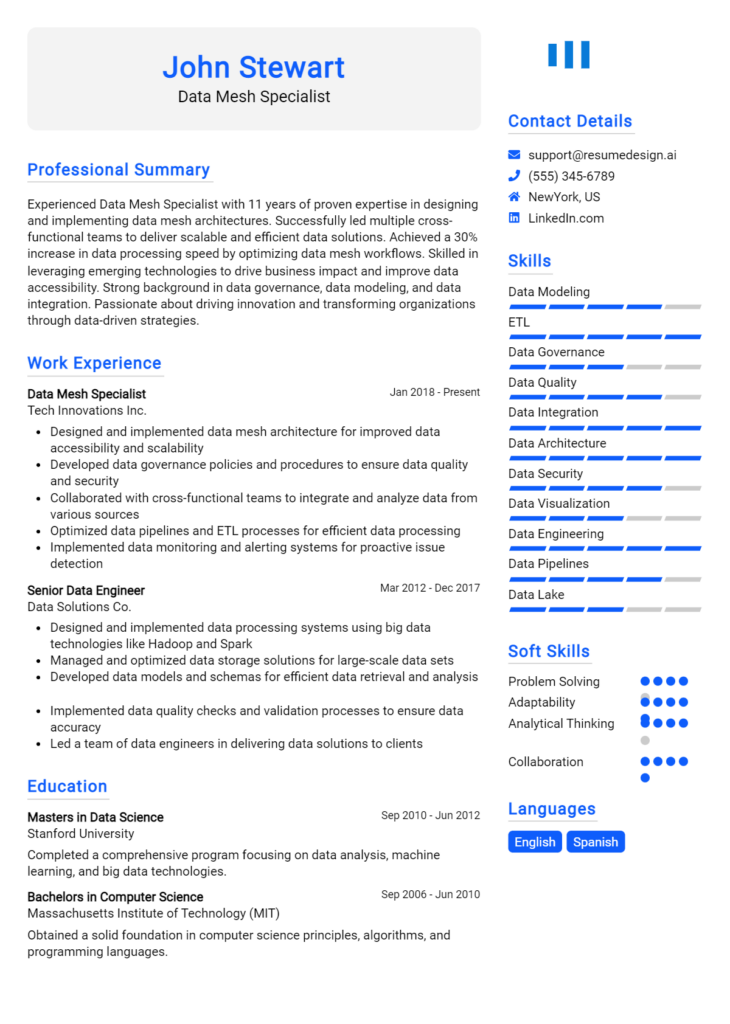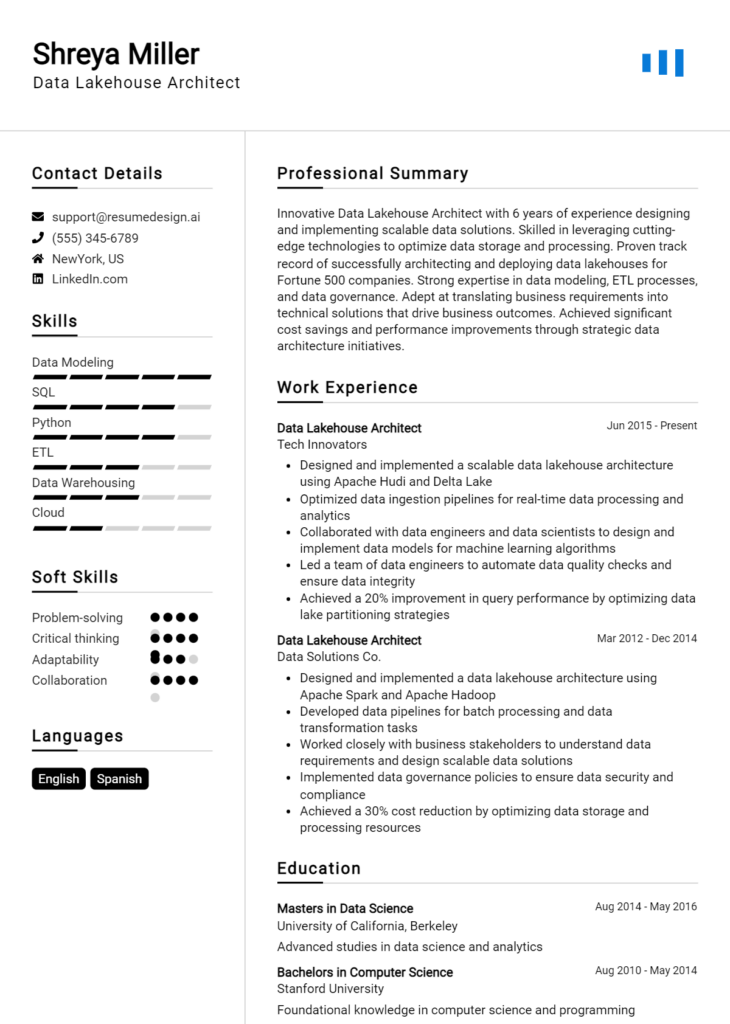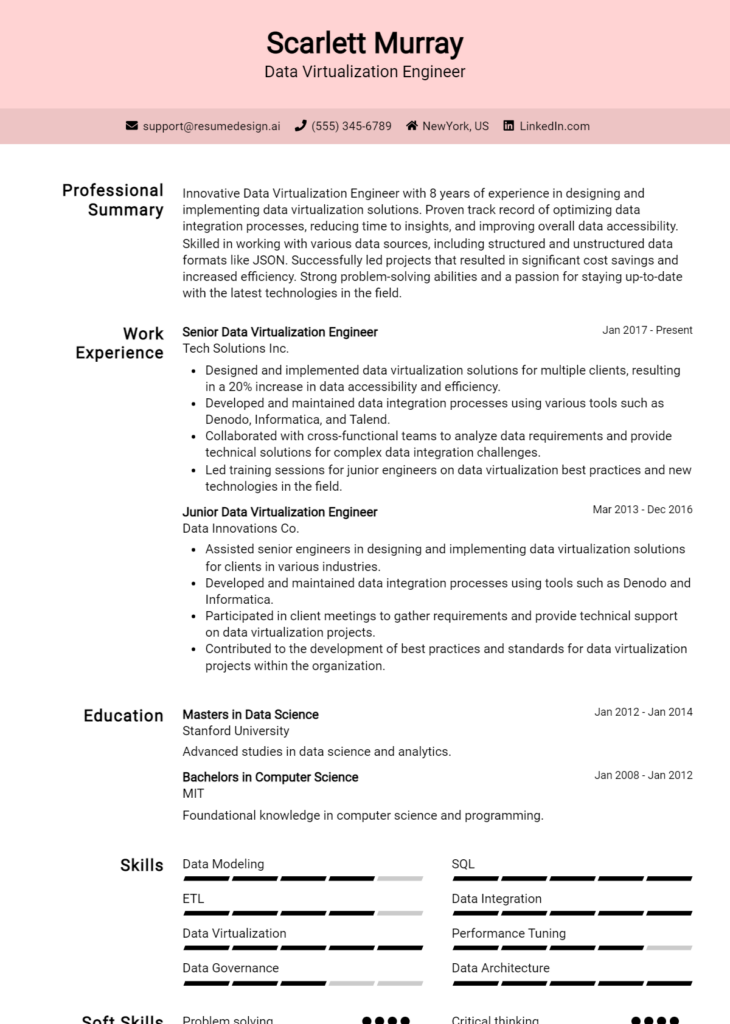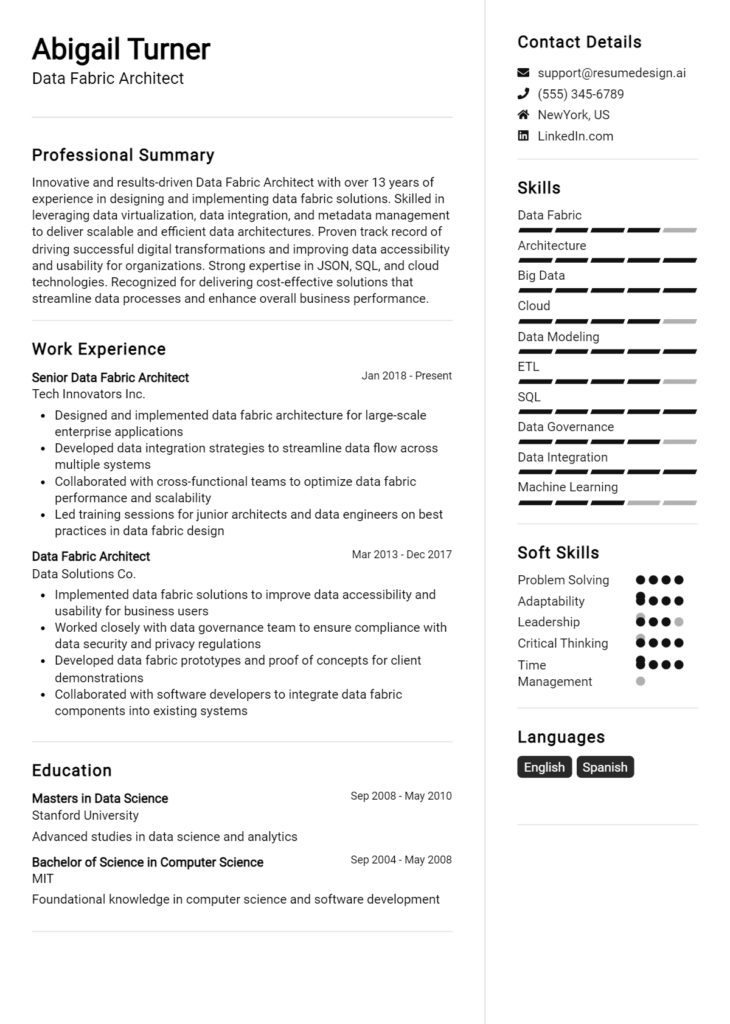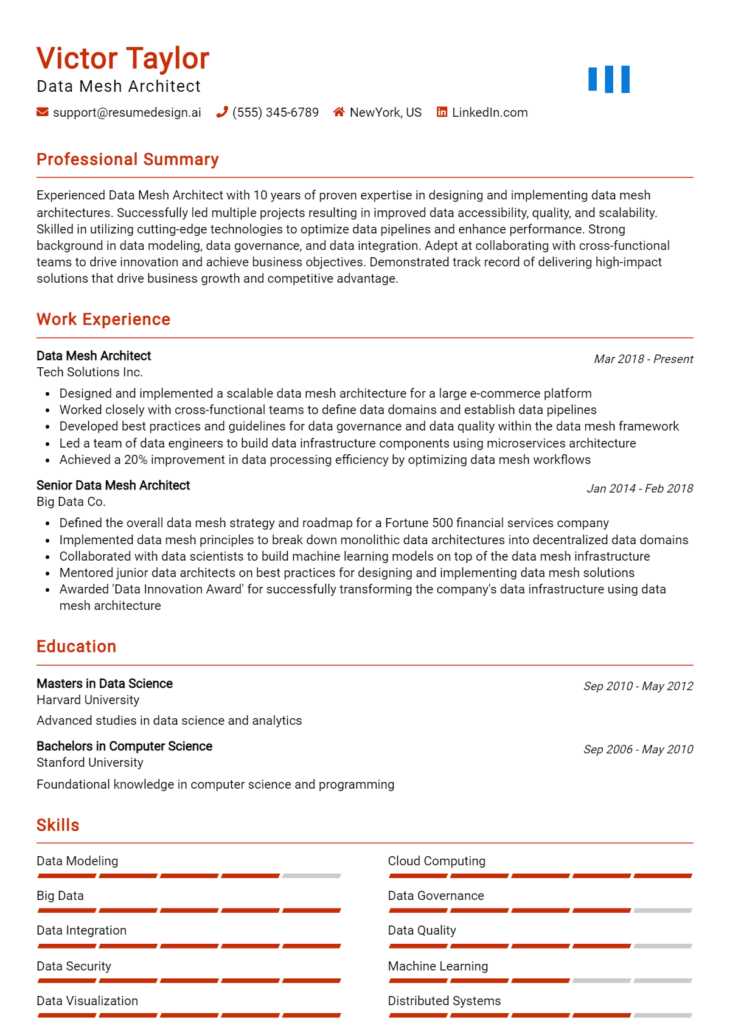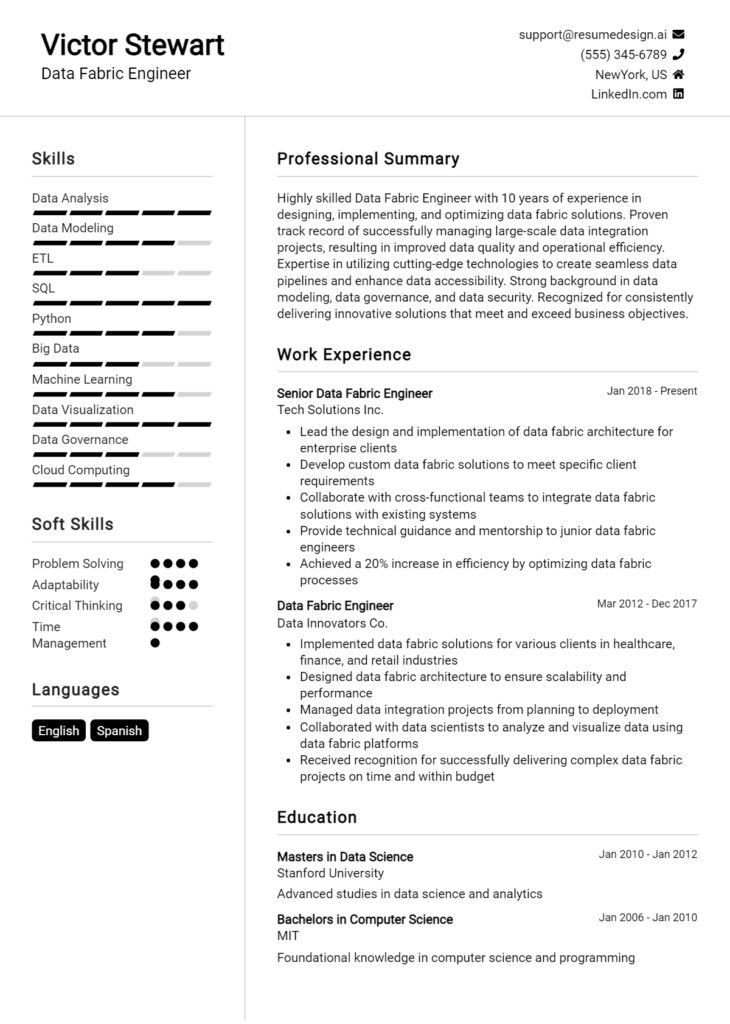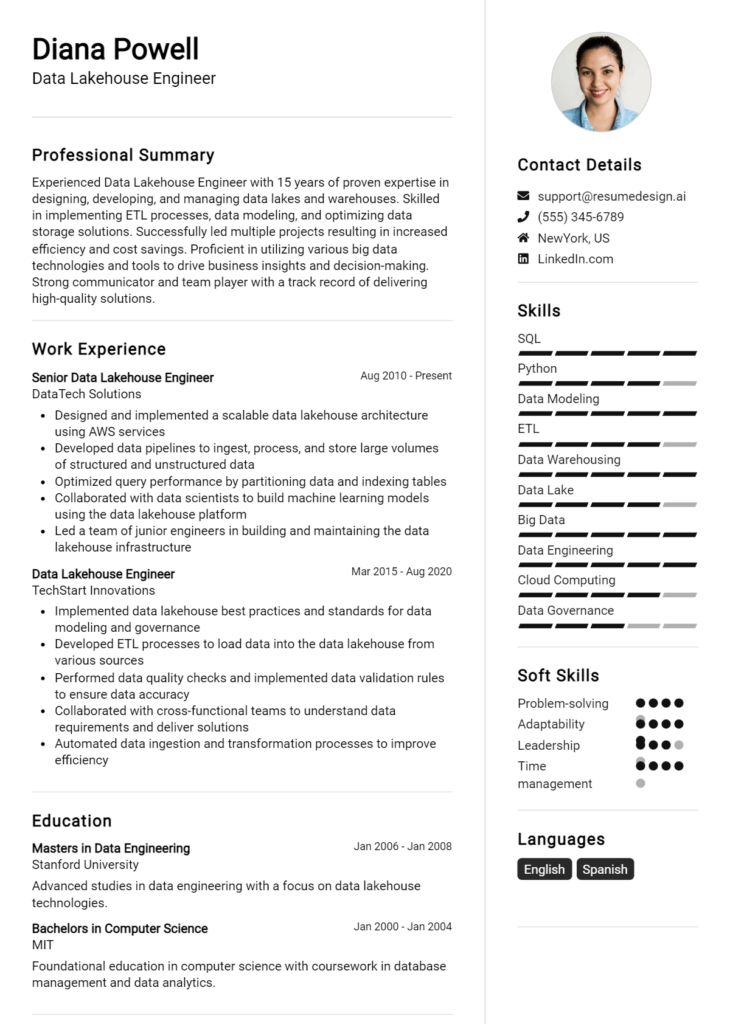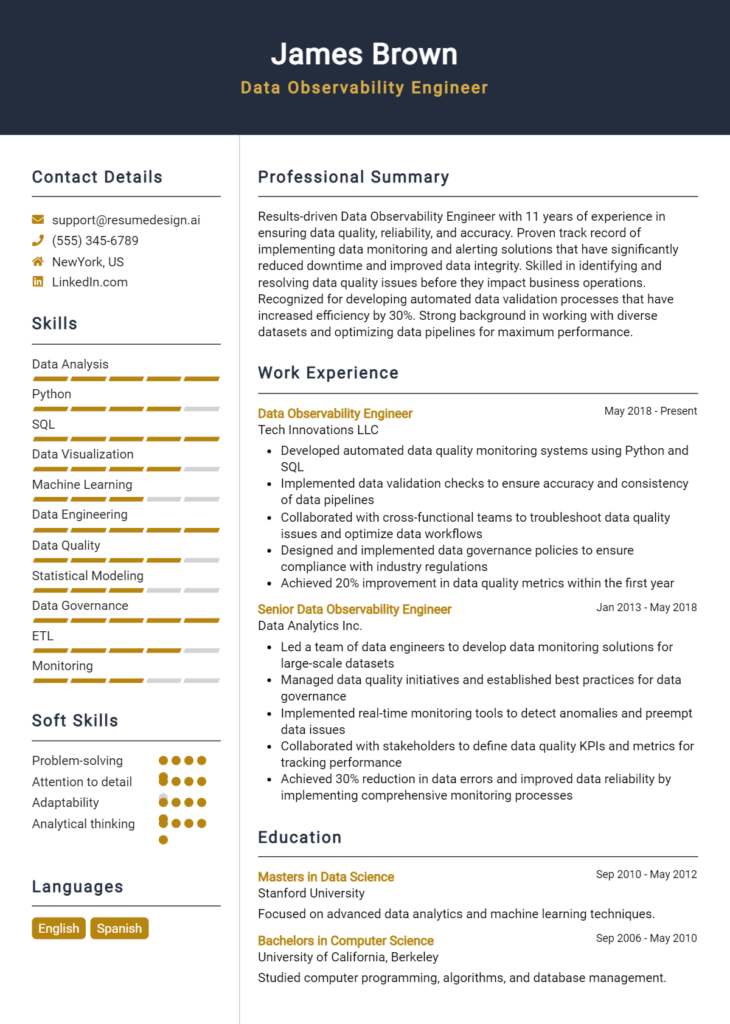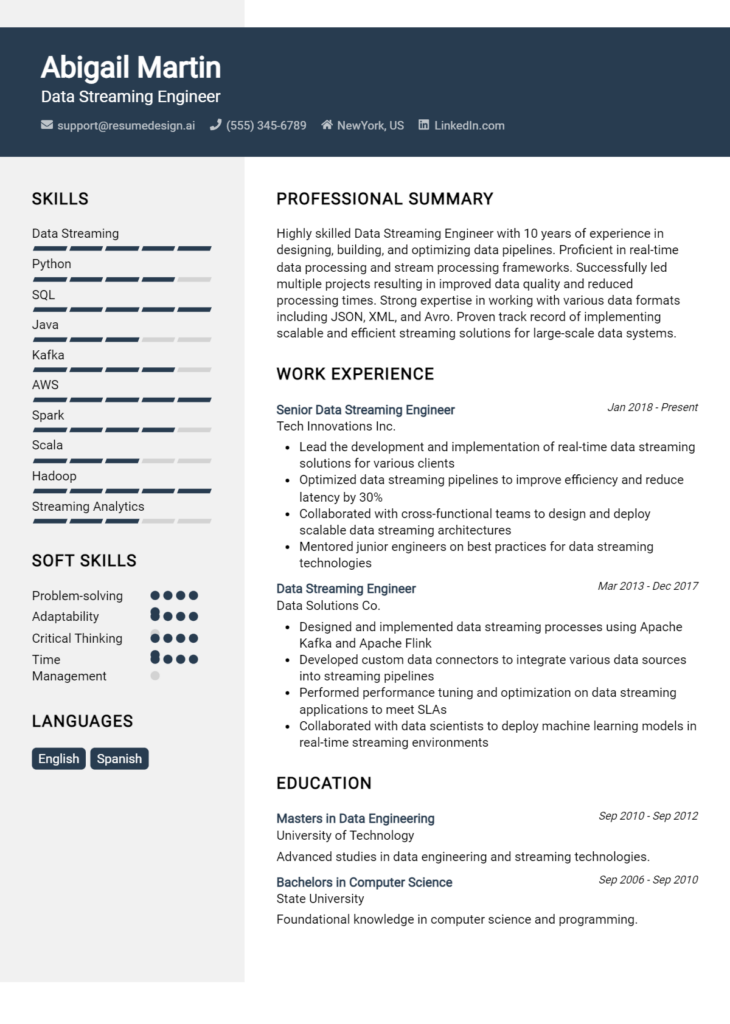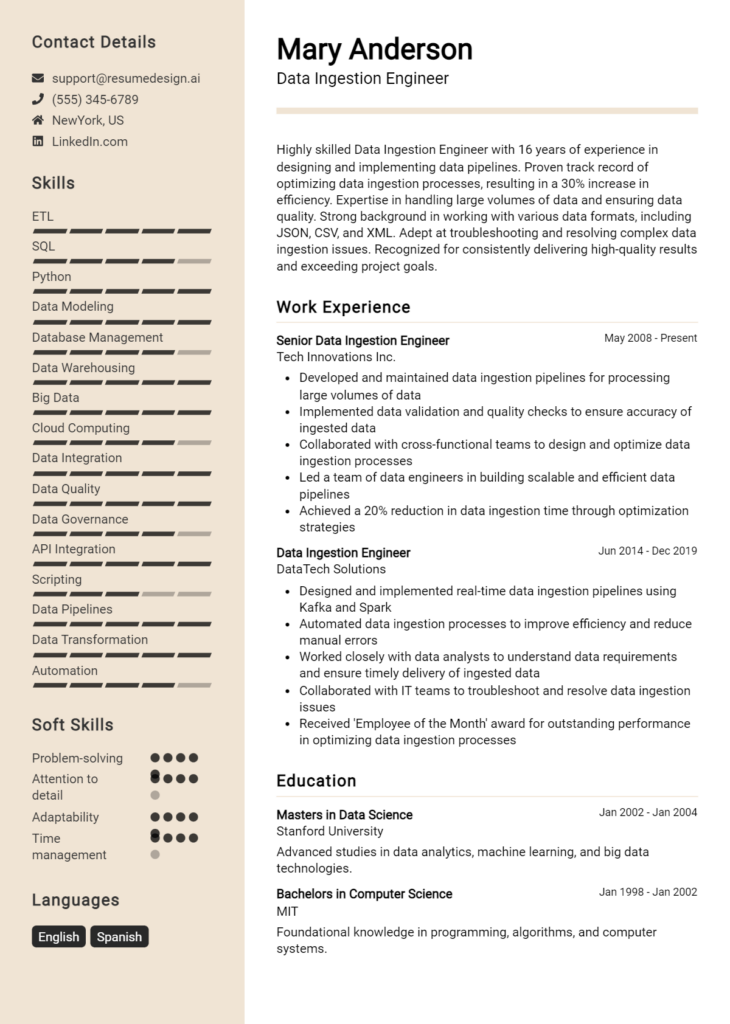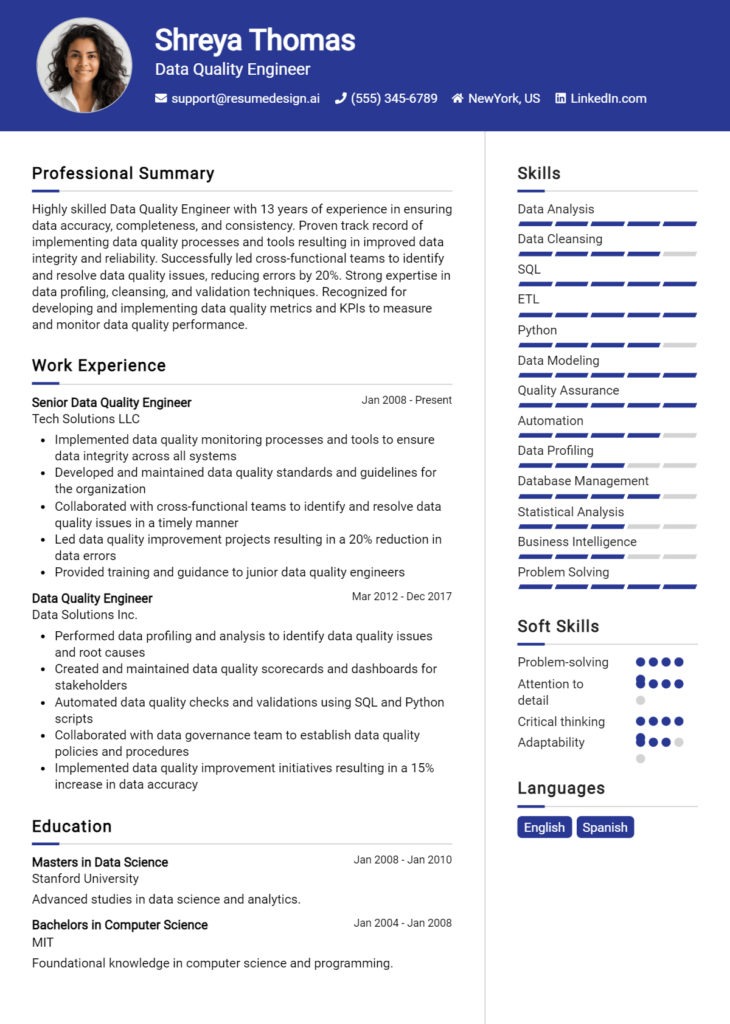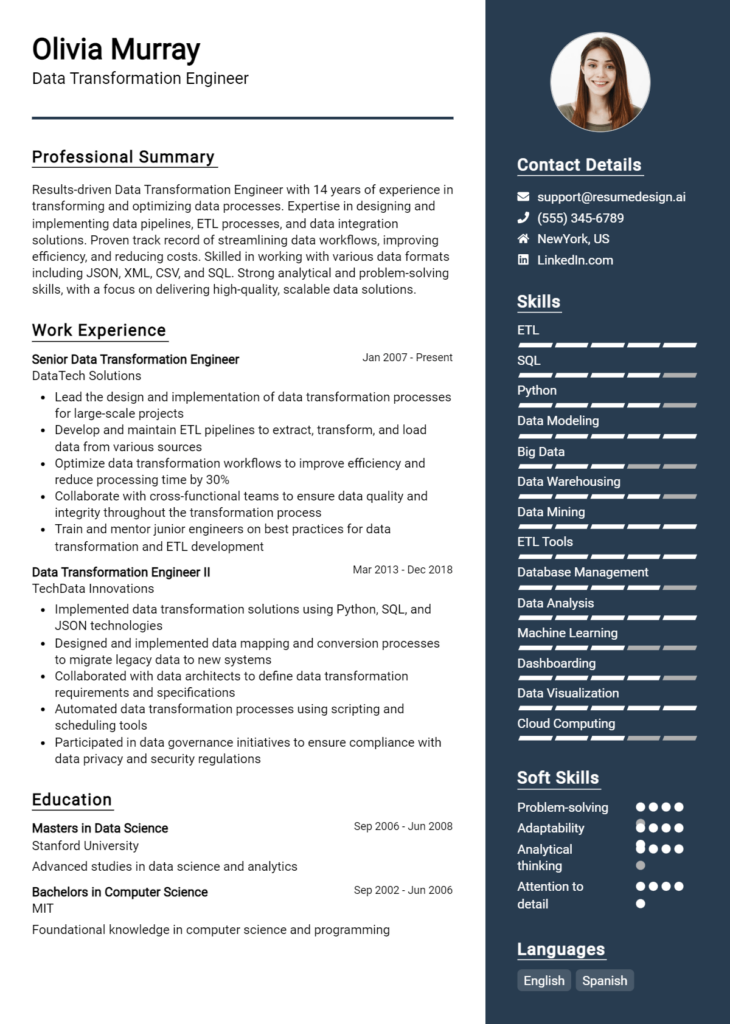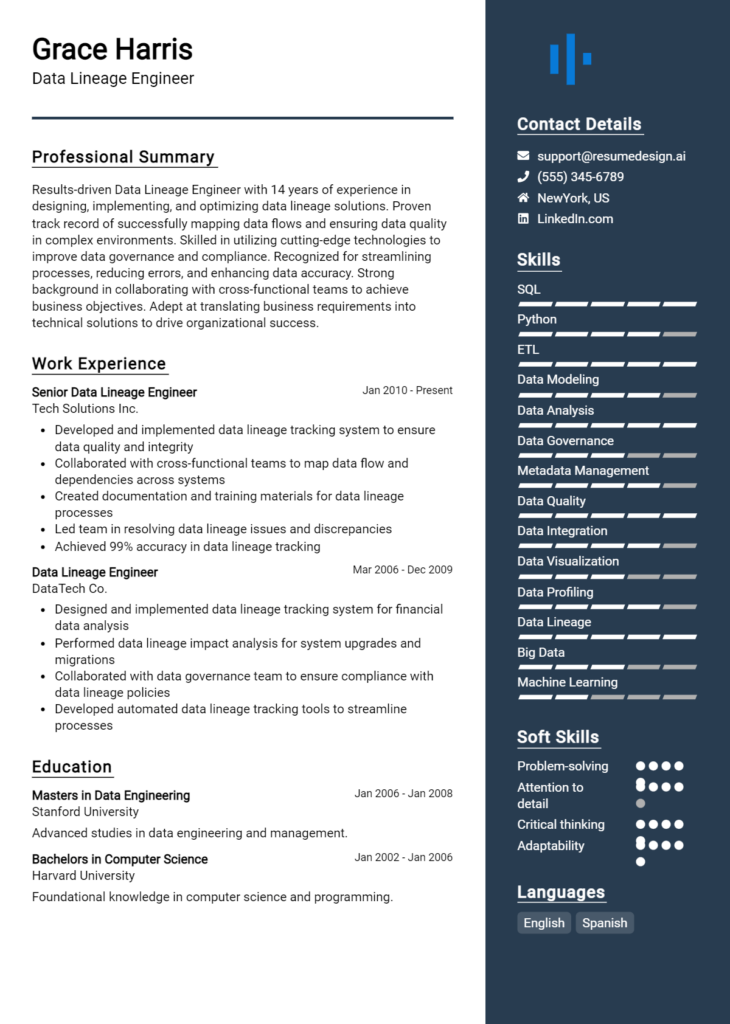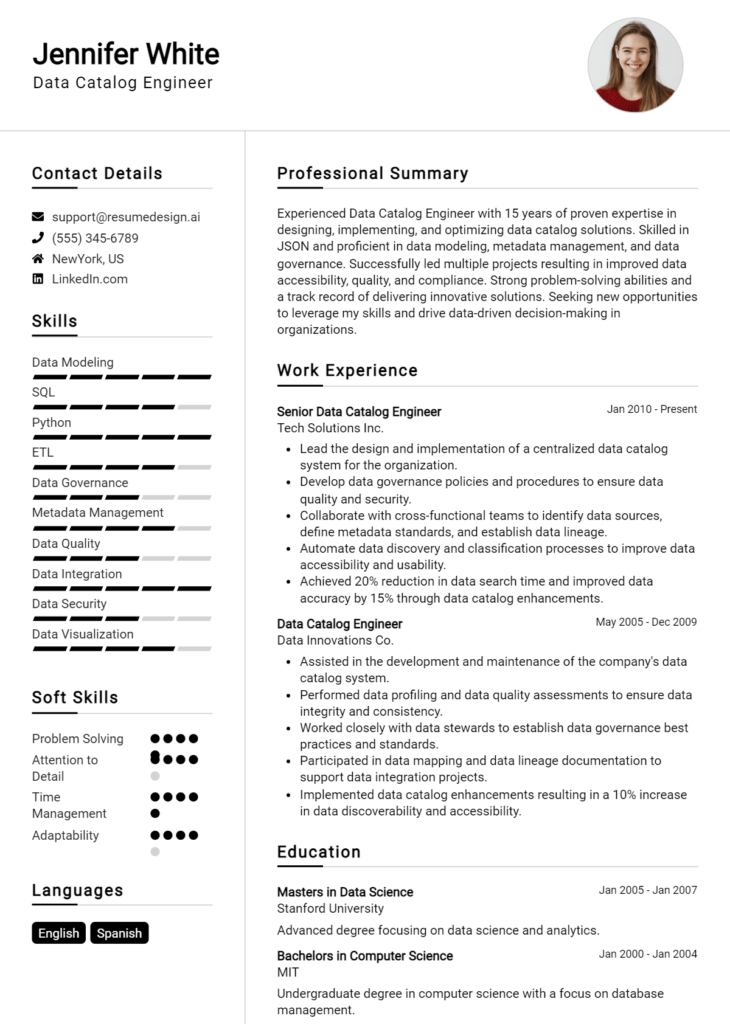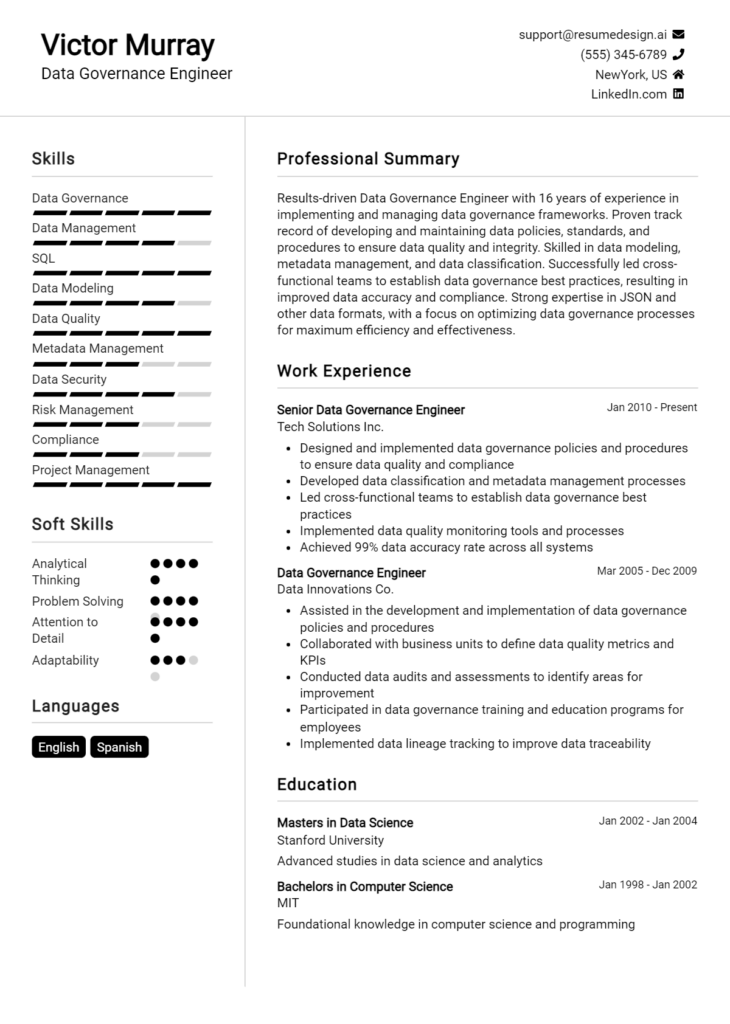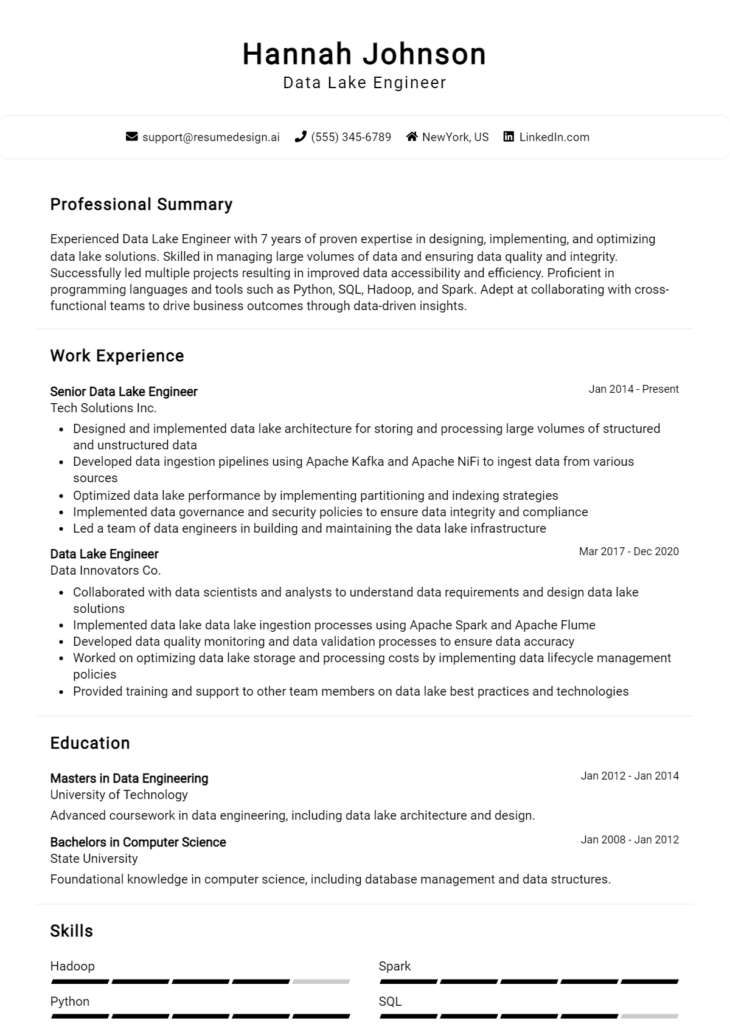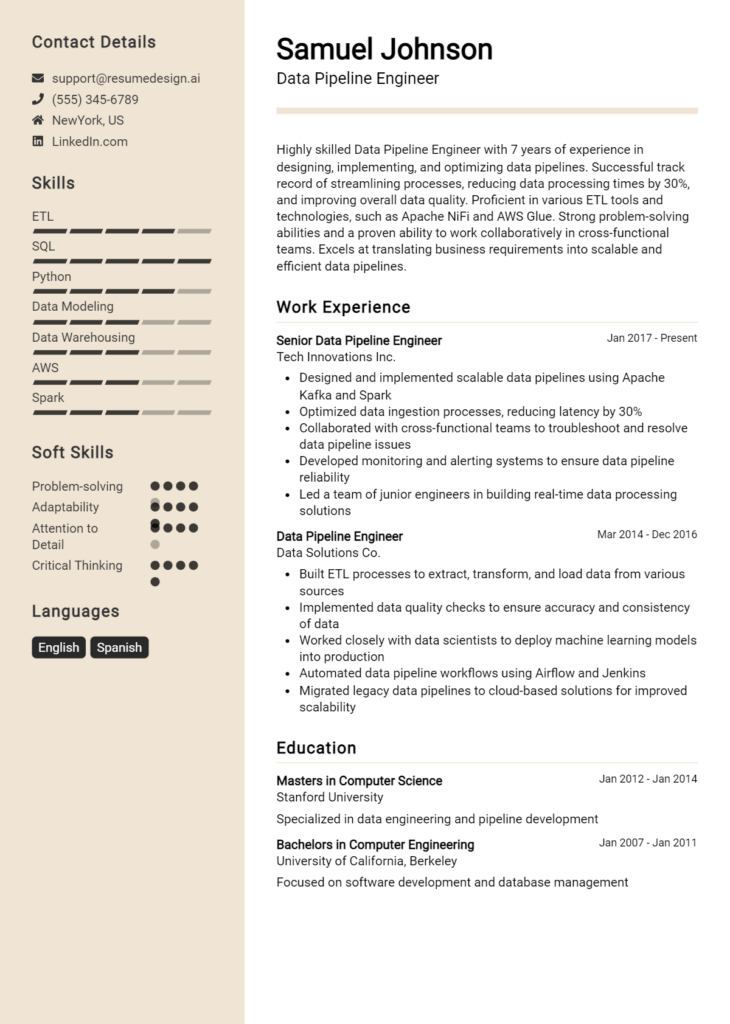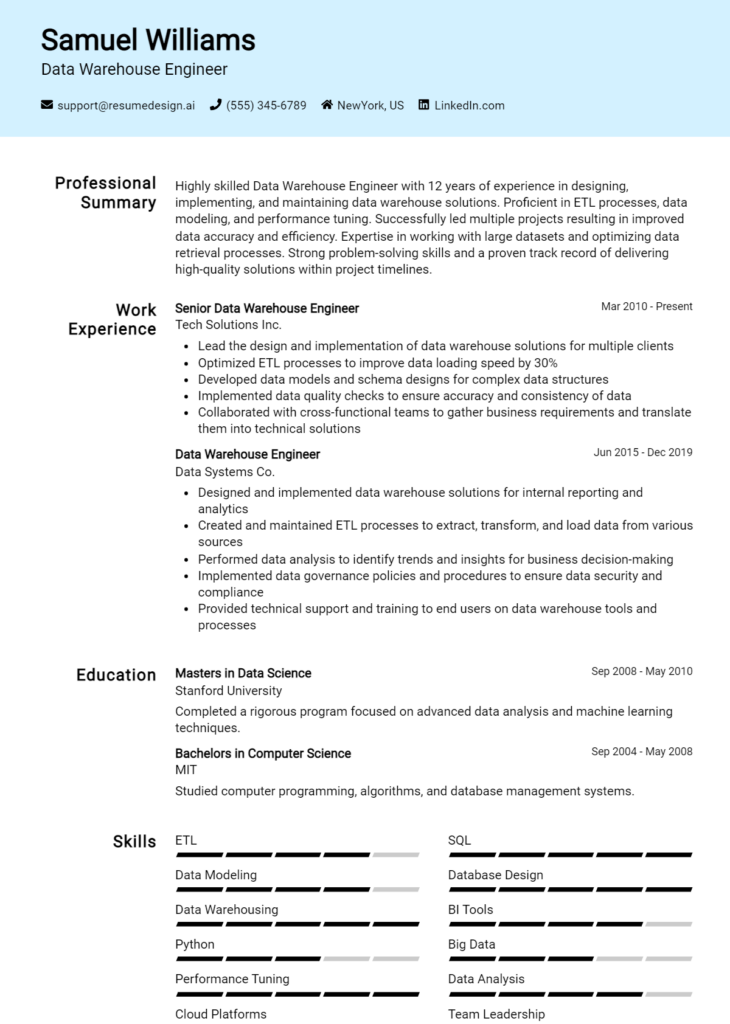Data Fabric Specialist Core Responsibilities
A Data Fabric Specialist plays a crucial role in integrating and managing data across various departments, ensuring seamless data flow between functions. This professional must possess strong technical skills in data architecture and analytics, operational expertise in data governance, and exceptional problem-solving abilities to address data-related challenges. By effectively bridging silos within the organization, they contribute significantly to achieving strategic goals. A well-structured resume that highlights these qualifications can effectively showcase a candidate's capabilities to potential employers.
Common Responsibilities Listed on Data Fabric Specialist Resume
- Design and implement data fabric architecture for seamless data integration.
- Collaborate with cross-functional teams to identify data needs and requirements.
- Develop and maintain data governance frameworks and policies.
- Monitor data quality and implement measures to ensure data accuracy.
- Analyze data flow and optimize processes for efficient data management.
- Utilize data visualization tools to present insights to stakeholders.
- Provide technical support for data-related issues across departments.
- Conduct training sessions to enhance data literacy among staff.
- Stay updated on industry trends and emerging data technologies.
- Ensure compliance with data protection regulations and standards.
High-Level Resume Tips for Data Fabric Specialist Professionals
In the competitive landscape of data management and analytics, a well-crafted resume is essential for Data Fabric Specialist professionals aiming to make a lasting impression. Often, the resume serves as the first point of contact between candidates and potential employers, highlighting not just their skills but also their accomplishments in the field. It is crucial that this document effectively communicates the candidate's expertise in data integration, governance, and management, reflecting both their technical capabilities and the value they can bring to an organization. This guide will provide practical and actionable resume tips specifically tailored for Data Fabric Specialist professionals, helping you to stand out in a crowded job market.
Top Resume Tips for Data Fabric Specialist Professionals
- Tailor your resume to the job description by aligning your skills and experiences with the specific requirements outlined in the posting.
- Highlight relevant experience in data management, integration, and analytics, emphasizing roles that involved data fabric solutions.
- Quantify your achievements using metrics and data points to demonstrate the impact of your work, such as improved data accessibility or reduced processing times.
- Showcase your proficiency with industry-specific tools and technologies, such as data lakes, ETL processes, and cloud platforms.
- Include certifications relevant to data management and analytics, such as those from cloud service providers or data governance organizations.
- Demonstrate your understanding of data governance and compliance frameworks, as these are critical in data fabric solutions.
- Incorporate keywords from the job posting to improve your resume's visibility in Applicant Tracking Systems (ATS).
- Use a clean, professional format that enhances readability and allows key information to stand out.
- Consider including a summary statement at the top of your resume that encapsulates your expertise and career objectives in the data landscape.
- Keep your resume concise and focused, ideally within one to two pages, ensuring it is easy for hiring managers to digest your qualifications quickly.
By implementing these tips, Data Fabric Specialist professionals can significantly enhance their resumes, improving their chances of capturing the attention of hiring managers and landing interviews in their desired roles. A thoughtfully crafted resume that clearly articulates skills and achievements will position candidates as strong contenders in the evolving data management field.
Why Resume Headlines & Titles are Important for Data Fabric Specialist
In the competitive landscape of data management and analytics, a Data Fabric Specialist plays a crucial role in integrating, managing, and optimizing data across diverse environments. As such, a well-crafted resume headline or title is essential for capturing the attention of hiring managers. A strong headline serves as a concise summary of a candidate's key qualifications, effectively encapsulating their expertise and making a memorable first impression. It should be relevant, succinct, and tailored to the specific job being applied for, ensuring that it immediately communicates the candidate's value proposition in the context of data fabric solutions.
Best Practices for Crafting Resume Headlines for Data Fabric Specialist
- Keep it concise: Aim for a headline that is no longer than 10-15 words.
- Be role-specific: Use terminology that is relevant to the Data Fabric Specialist position.
- Highlight key skills: Incorporate essential skills or technologies related to data management.
- Showcase achievements: If possible, include quantifiable accomplishments to demonstrate impact.
- Use action-oriented language: Start with action verbs to convey dynamism and proactivity.
- Avoid clichés: Steer clear of generic phrases that do not provide specific insights into your capabilities.
- Tailor to the job description: Align your headline with the specific requirements of the job you are applying for.
- Make it impactful: Choose words that evoke confidence and expertise in data fabric solutions.
Example Resume Headlines for Data Fabric Specialist
Strong Resume Headlines
"Data Fabric Specialist with 5+ Years of Experience in Real-Time Data Integration"
“Expert in Multi-Cloud Data Fabric Solutions for Enhanced Analytics Performance”
“Results-Driven Data Fabric Specialist Skilled in Big Data Technologies and Governance”
Weak Resume Headlines
“Data Specialist Looking for Opportunities”
“Experienced Professional in Data Management”
The strong headlines are effective because they clearly communicate the candidate’s specific skills, experiences, and the value they bring to the role of a Data Fabric Specialist. They utilize relevant keywords and present a focused message that aligns with the job requirements. In contrast, the weak headlines fail to impress due to their vagueness and lack of specificity, leaving hiring managers without a clear understanding of the candidate’s qualifications or unique contributions to the role. A strong headline not only captures attention but also sets the tone for the rest of the resume, enhancing the candidate's chances of being noticed in a crowded job market.
Writing an Exceptional Data Fabric Specialist Resume Summary
A well-crafted resume summary is crucial for a Data Fabric Specialist as it serves as the first impression for hiring managers. This brief introduction allows candidates to succinctly present their key skills, relevant experience, and notable accomplishments, effectively capturing the attention of prospective employers. A strong summary should be concise, impactful, and specifically tailored to the job being applied for, demonstrating a clear alignment with the needs of the organization. By doing so, candidates can set themselves apart in a competitive job market, making it easier for hiring managers to recognize their potential value to the team.
Best Practices for Writing a Data Fabric Specialist Resume Summary
- Quantify achievements to demonstrate impact, such as "improved data retrieval times by 30%."
- Focus on relevant skills that align with the job description, such as data integration, data governance, and analytics.
- Tailor the summary for the specific job by incorporating keywords from the job posting.
- Keep it concise, ideally between 3-5 sentences, to maintain the reader's attention.
- Highlight unique experiences or certifications that set you apart, such as specific data management tools or methodologies.
- Use strong action verbs to convey a sense of proactivity and results-oriented attitude.
- Avoid jargon and overly technical language that may confuse the reader.
- Showcase a blend of technical expertise and soft skills, such as teamwork or communication abilities.
Example Data Fabric Specialist Resume Summaries
Strong Resume Summaries
Data Fabric Specialist with over 6 years of experience in integrating complex data systems, resulting in a 40% reduction in data silos for large organizations. Proficient in utilizing advanced ETL tools and data governance frameworks to enhance data quality and accessibility.
Results-driven Data Fabric Specialist with a track record of implementing data strategies that increased analytical capabilities by 50%. Adept at leveraging cloud technologies and big data solutions to drive insights and support business objectives.
Dynamic Data Fabric Specialist with expertise in data architecture and integration, successfully leading projects that improved data processing efficiency by 35%. Holds a certification in Data Management and skilled in SQL, Python, and data visualization tools.
Weak Resume Summaries
Experienced data professional looking for a position in data management. Good at working with data.
Data Fabric Specialist with some experience in the field. I have skills in various data technologies.
The strong resume summaries are considered effective because they provide specific achievements, quantify results, and directly relate to the responsibilities of a Data Fabric Specialist. They showcase relevant skills and experiences, making it easy for hiring managers to see the candidates as valuable assets. In contrast, the weak summaries lack detail and specificity, failing to highlight any measurable outcomes or unique skills, which diminishes their impact and appeal to potential employers.
Work Experience Section for Data Fabric Specialist Resume
The work experience section of a Data Fabric Specialist resume is a critical component that demonstrates the candidate's technical skills, leadership abilities, and capacity to deliver high-quality products. This section not only highlights specific projects and roles but also provides a platform for candidates to quantify their achievements, showcasing their impact within organizations. Aligning work experience with industry standards and expectations is crucial, as it allows potential employers to evaluate the candidate's fit for the role based on proven performance and measurable outcomes.
Best Practices for Data Fabric Specialist Work Experience
- Utilize action verbs to describe responsibilities and achievements, creating an engaging narrative.
- Focus on quantifiable results, such as percentage improvements or cost savings, to provide clear evidence of success.
- Highlight specific technical skills and tools used, ensuring alignment with industry standards and job descriptions.
- Detail collaboration efforts, including cross-functional teamwork and communication with stakeholders, to demonstrate interpersonal skills.
- Showcase leadership experiences, including team management or project oversight, to exhibit capability in guiding others.
- Customize the work experience section for each application, emphasizing relevant experiences that match the job requirements.
- Incorporate keywords from the job description to enhance visibility in applicant tracking systems.
- Keep descriptions concise and focused, allowing for easy scanning by hiring managers.
Example Work Experiences for Data Fabric Specialist
Strong Experiences
- Led a cross-functional team to develop a data integration solution that improved data accessibility by 40%, enhancing reporting accuracy for executive decision-making.
- Implemented a data governance framework that reduced data discrepancies by 30%, resulting in significant operational efficiency gains.
- Managed the deployment of a cloud-based data fabric architecture, achieving a 25% reduction in data retrieval times and supporting real-time analytics.
- Collaborated with IT and business units to design a scalable data pipeline, increasing data processing throughput by 50% and supporting a larger volume of analytics queries.
Weak Experiences
- Worked on data projects that involved various tools.
- Participated in team meetings to discuss data issues.
- Assisted with data management tasks as needed.
- Contributed to the data analysis process without specific outcomes.
The examples of strong experiences are considered effective because they provide specific, measurable outcomes and clearly articulate the candidate's technical leadership and collaborative efforts. In contrast, the weak experiences lack detail and quantifiable results, making it difficult for hiring managers to assess the candidate’s impact or relevance to the role, ultimately diminishing their appeal.
Education and Certifications Section for Data Fabric Specialist Resume
The education and certifications section of a Data Fabric Specialist resume is crucial as it provides a comprehensive overview of the candidate's academic foundation, relevant industry certifications, and commitment to ongoing professional development. This section not only underscores the candidate's qualifications but also demonstrates their dedication to staying current in a rapidly evolving field. By including pertinent coursework, specialized training, and recognized certifications, candidates can significantly enhance their credibility and align themselves closely with the specific requirements of the job role.
Best Practices for Data Fabric Specialist Education and Certifications
- Prioritize relevant degrees in data science, computer science, information technology, or related fields.
- List industry-recognized certifications such as Certified Data Management Professional (CDMP) or Google Cloud Professional Data Engineer.
- Include advanced degrees (e.g., Master's or PhD) that may set you apart from other candidates.
- Detail relevant coursework that aligns with data fabric concepts, such as data integration, cloud computing, and big data analytics.
- Highlight any specialized training or workshops that demonstrate proficiency in specific tools or technologies related to data fabric.
- Keep the section updated to reflect the most current credentials and educational achievements.
- Use clear formatting to enhance readability, making it easy for hiring managers to identify key qualifications quickly.
- Tailor the content to match the job description, emphasizing the most relevant qualifications for the Data Fabric Specialist role.
Example Education and Certifications for Data Fabric Specialist
Strong Examples
- M.S. in Data Science, University of California, Berkeley, 2021
- Certified Data Management Professional (CDMP), Data Management Association, 2022
- Specialized Training in Data Fabric Architecture, Coursera, 2023
- Relevant Coursework: Big Data Analytics, Cloud Data Management, Data Integration Techniques
Weak Examples
- B.A. in History, University of Texas, 2015
- Certification in Basic IT Skills, Online Academy, 2016
- Outdated Certification: Microsoft Certified Solutions Expert (MCSE), obtained in 2014
- General Coursework: Introduction to Psychology, 2018
The strong examples are considered relevant as they directly align with the requirements and skills necessary for a Data Fabric Specialist role, showcasing advanced degrees, pertinent certifications, and specialized training. In contrast, the weak examples lack relevance to the field, either due to outdated content or a lack of focus on data fabric-related skills, which diminishes their effectiveness in demonstrating the candidate's qualifications for the role.
Top Skills & Keywords for Data Fabric Specialist Resume
In the rapidly evolving field of data management, a Data Fabric Specialist plays a crucial role in ensuring seamless data integration and accessibility across diverse platforms. To stand out in this competitive arena, a well-crafted resume that highlights both hard and soft skills is essential. Hiring managers are increasingly looking for candidates who not only possess technical expertise but also demonstrate strong interpersonal abilities. A resume that effectively showcases these skills can significantly enhance a candidate's chances of landing an interview. For more insights on how to effectively present your skills, check out this comprehensive resource on skills.
Top Hard & Soft Skills for Data Fabric Specialist
Soft Skills
- Strong Communication
- Problem-Solving
- Collaboration and Teamwork
- Critical Thinking
- Adaptability
- Time Management
- Attention to Detail
- Creativity
- Leadership
- Customer Orientation
Hard Skills
- Data Integration Techniques
- Knowledge of Data Governance
- Familiarity with ETL Processes
- Proficiency in SQL and NoSQL Databases
- Experience with Data Warehousing Solutions
- Understanding of Cloud Platforms (AWS, Azure, Google Cloud)
- Data Modeling and Architecture Skills
- Familiarity with Data Fabric Tools (e.g., Talend, Apache NiFi)
- Proficient in Data Visualization Tools (e.g., Tableau, Power BI)
- Knowledge of Big Data Technologies (e.g., Hadoop, Spark)
A well-structured resume that emphasizes these skills can greatly enhance your profile as a Data Fabric Specialist. Additionally, don't forget to showcase your relevant work experience to further strengthen your application.
Stand Out with a Winning Data Fabric Specialist Cover Letter
Dear Hiring Manager,
I am excited to apply for the Data Fabric Specialist position at [Company Name] as advertised on [Job Board/Company Website]. With a strong background in data management and a proven track record of implementing data fabric solutions, I am confident in my ability to contribute significantly to your team. My experience in designing and optimizing data architectures has equipped me with the skills necessary to enhance data accessibility and integration across complex environments, which I understand are critical to [Company Name]'s mission of leveraging data for informed decision-making.
In my previous role at [Previous Company Name], I successfully led a project that integrated disparate data sources into a cohesive data fabric. This initiative not only improved data visibility but also reduced retrieval times by 30%. I utilized a combination of cloud technologies and on-premises solutions, ensuring a seamless flow of information across the organization. My hands-on experience with data governance frameworks and my ability to collaborate with cross-functional teams allowed me to implement best practices that fostered a culture of data-driven strategies and analytics.
I am particularly drawn to the opportunity at [Company Name] because of your commitment to innovation and excellence in data management. I am eager to bring my expertise in data integration, metadata management, and analytics to your organization. I am confident that my proactive approach and dedication to continuous improvement will enable me to make a positive impact on your data initiatives and help drive the strategic goals of [Company Name].
Thank you for considering my application. I look forward to the opportunity to discuss how my skills and experiences align with the needs of your team. I am excited about the possibility of contributing to [Company Name]'s success and am eager to explore how I can be an asset in your data transformation journey.
Sincerely,
[Your Name]
Common Mistakes to Avoid in a Data Fabric Specialist Resume
Crafting a compelling resume as a Data Fabric Specialist requires attention to detail and a clear understanding of the skills and experiences that are most relevant to the role. However, many candidates fall into common traps that can undermine their chances of securing an interview. To help you stand out in a competitive job market, here are some typical mistakes to avoid when preparing your resume:
Vague Job Descriptions: Using generic job descriptions that don’t highlight specific technologies or methodologies related to data fabric can make your experience seem less relevant.
Ignoring Keywords: Failing to incorporate industry-specific keywords from the job description can lead to your resume being overlooked by applicant tracking systems (ATS) that scan for relevant terms.
Overlooking Soft Skills: While technical skills are crucial, neglecting to showcase soft skills like communication, teamwork, and problem-solving can give an incomplete picture of your capabilities.
Lack of Quantifiable Achievements: Not including measurable outcomes from your previous roles, such as increases in data processing speed or improvements in data accessibility, can make your contributions less impactful.
Too Much Jargon: Using excessive technical jargon without explanation can alienate recruiters who may not be familiar with niche terms, making it harder for them to evaluate your expertise.
Inconsistent Formatting: A resume with inconsistent fonts, sizes, or bullet points can appear unprofessional and distract from the content, making it harder for recruiters to focus on your qualifications.
Neglecting Professional Development: Failing to mention relevant certifications, training, or ongoing education related to data fabric technologies can give the impression that you're not committed to staying current in the field.
Ignoring the Summary Section: Not using a summary or objective statement at the beginning of your resume can miss an opportunity to succinctly convey your expertise and career goals to potential employers.
Conclusion
As a Data Fabric Specialist, your role is pivotal in ensuring that data is seamlessly integrated and accessible across various platforms and applications. Throughout this article, we've explored the essential skills and qualifications necessary for this position, including expertise in data architecture, cloud computing, and data governance. We also highlighted the importance of staying updated with the latest technologies and methodologies to effectively manage and utilize data resources.
In conclusion, it's crucial to present your qualifications and experiences compellingly through your resume. A well-structured resume can significantly enhance your chances of landing an interview. We encourage you to take the time to review your Data Fabric Specialist resume and ensure it reflects your skills and achievements accurately.
To assist you in this process, we recommend utilizing resources like resume templates, which can provide a professional layout, or the resume builder for a more customized approach. Additionally, you can explore resume examples to gain inspiration from successful candidates in your field. Don't forget to pair your resume with a compelling application by using our cover letter templates.
Take action today and refine your resume to stand out in the competitive job market for Data Fabric Specialists!

